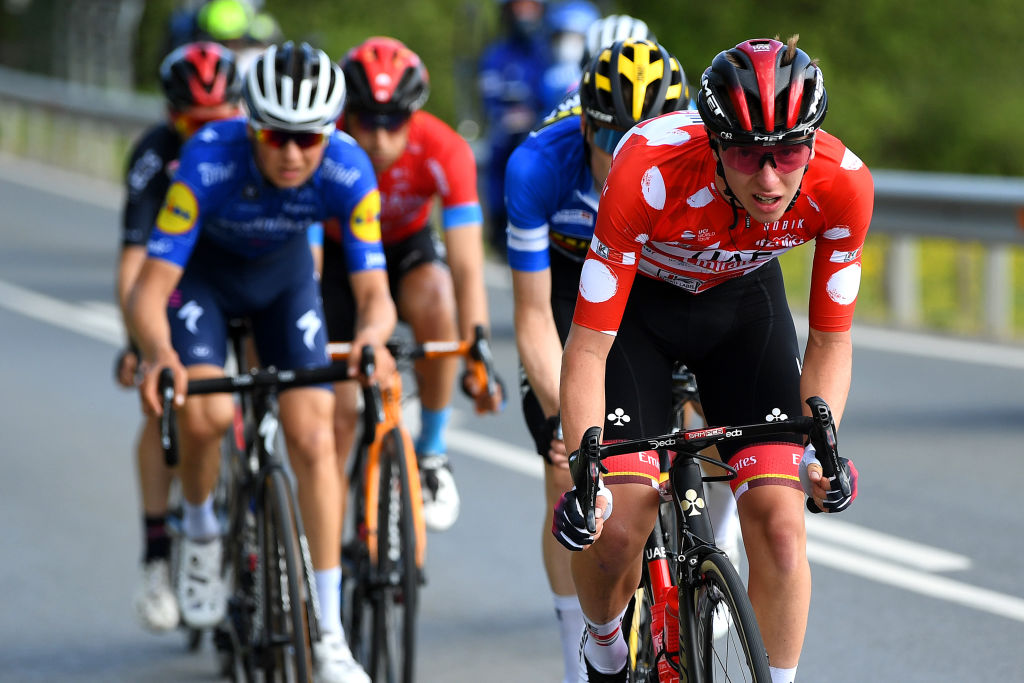Pogacar goes down all guns blazing in Itzulia Basque Country
2020 Tour de France champion finishes third overall after trying to defend teammate McNulty's lead

In all the understandable fuss about Primož Roglič's (Jumbo-Visma) dramatic last-minute return to the top of this year’s Itzulia Basque Country GC, another final twist of the race’s complex plot-line almost went unnoticed, when Tadej Pogačar (UAE Team Emirates) ousted Pello Bilbao (Bahrain-Victorious) from third overall.
Pogačar’s dispatching of Bilbao took place halfway up the final climb, the Arrate, when the umpteenth lifting of pace by the Slovenian saw the Basque racer struggle and lose 28 seconds by the line.
But if Pogačar’s efforts netted him his third WorldTour podium finish in as many races, for all he had been a tireless driving force in the chase group behind Roglič for nearly 60 kilometers, he could not succeed either keeping teammate Brandon McNulty from holding onto the lead or rejoin Roglič to try and do battle for the overall crown.
Instead, McNulty finally slumped to 23rd, nearly eight minutes back, after the crunch moment of the entire stage, and arguably the race, came when he was unable to follow Pogačar on the ultra-steep slopes of the Krabelin, actually a back road alternative, and a far harder one at that, to the traditional ascent of the Arrate.
By that point, Roglič’s lead had actually shrunk to 30 seconds, but when McNulty crumbled, Pogačar seemingly had no choice but to power on in search of the third place, only to find that Roglič had shattered the group ahead with his own high pace on the same climb, and the lead once again began to re-open.
It was a stalemate, but with each kilometre that passed, Pogačar’s options were shrinking, and if taking out Bilbao allowed him to move from fifth to third, when Pogačar crossed the line in fifth place 35 seconds down, the Roglič was already celebrating a Jumbo-Visma 1-2 overall with Jonas Vingegaard.
Pogačar did not credit Roglič with the attack, in any case, that effectively settled the race, saying it had been a move by Astana on a downhill, (off the second category Elosua-Gorla, the fourth climb of the day) that had lit the fuse on the older Slovenian’s race-winning move.
The latest race content, interviews, features, reviews and expert buying guides, direct to your inbox!
"I don’t think Primož’s attack was when the race was decided,” he said. “It was the Astana guys,” more specifically Omar Fraile.
“We controlled the race. We had Marc [Hirschi] in the breakaway, we were pulling behind and then the Astana guys attacked us on top of the climb and we just lost some positions.
“They went at full speed ahead of us and we were in tenth position, Brandon and I, behind [Jonas] Vingegaard and one Ineos rider. He made a little gap and it was impossible to pass immediately to close it.
“After two or three corners the gap was bigger and we lost touch with the first group. That was the race broken.”
Pogačar said that as much as anything else, the timing and location of the attack had made it much more dangerous than it could have been elsewhere.
“If the attack happened on the climb or on the flat, you could follow, but it’s impossible to follow on the descent. It is how it is,” he said.”
“We called Marc back and we tried to pull it back but Brandon exploded on the steep climb because when you go full gas it’s really hard. Then there was a fight to come back to the first group for me, but I was just a bit too short and I was fighting for third place.
“Of course, we would like to be in there for the win but it was impossible.”
If UAE Team Emirates came off badly mauled by Roglič’s attack, Pogačar’s third place overall surely offered some consolation, though, in a race where UAE has had a stage win, ahead of Roglič, and after a deft strategic move on stage 4, held the overall lead for two days.
Determined to look on the brighter side, Pogačar had some glowing praise, too, for his teammate McNulty, finally 17th overall.
“Brandon showed he has good character, and he is a really good rider with a bright future. We had fun this week, we did our best, we tried and under the circumstances, we are really happy.”
Pogačar’s next goals, in any case, are in the very different arena of one-day Classics, at Flèche Wallonne and Liège-Bastogne-Liège. After which, he said, “there will be a little bit of rest for me”, but not much: the Tour de France is fast looming on the horizon.
Alasdair Fotheringham has been reporting on cycling since 1991. He has covered every Tour de France since 1992 bar one, as well as numerous other bike races of all shapes and sizes, ranging from the Olympic Games in 2008 to the now sadly defunct Subida a Urkiola hill climb in Spain. As well as working for Cyclingnews, he has also written for The Independent, The Guardian, ProCycling, The Express and Reuters.
